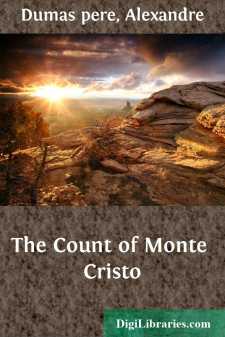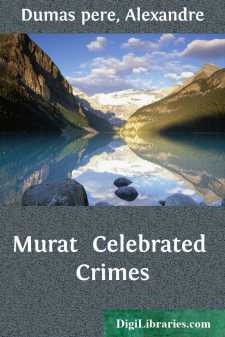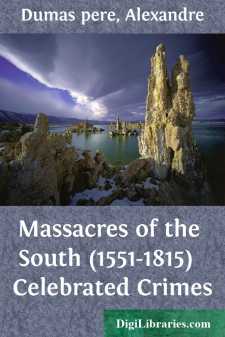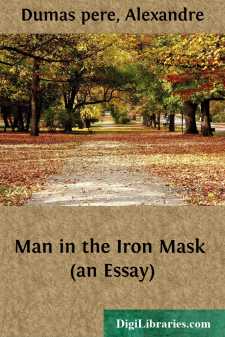Categories
- Antiques & Collectibles 13
- Architecture 36
- Art 48
- Bibles 22
- Biography & Autobiography 813
- Body, Mind & Spirit 142
- Business & Economics 28
- Children's Books 17
- Children's Fiction 14
- Computers 4
- Cooking 94
- Crafts & Hobbies 4
- Drama 346
- Education 46
- Family & Relationships 57
- Fiction 11829
- Games 19
- Gardening 17
- Health & Fitness 34
- History 1377
- House & Home 1
- Humor 147
- Juvenile Fiction 1873
- Juvenile Nonfiction 202
- Language Arts & Disciplines 88
- Law 16
- Literary Collections 686
- Literary Criticism 179
- Mathematics 13
- Medical 41
- Music 40
- Nature 179
- Non-Classifiable 1768
- Performing Arts 7
- Periodicals 1453
- Philosophy 64
- Photography 2
- Poetry 896
- Political Science 203
- Psychology 42
- Reference 154
- Religion 513
- Science 126
- Self-Help 84
- Social Science 81
- Sports & Recreation 34
- Study Aids 3
- Technology & Engineering 59
- Transportation 23
- Travel 463
- True Crime 29
Alexandre Dumas pere
Alexandre Dumas was a prolific French writer best known for his historical adventure novels, including "The Three Musketeers" and "The Count of Monte Cristo." Born in 1802, he was the son of Thomas-Alexandre Dumas, a mixed-race general in Revolutionary France. Dumas's works are celebrated for their fast-paced narratives, vivid characters, and intricate plots, making him one of the most widely read French authors in the world.
Author's Books:
Sort by:
Chapter 1. A Grateful People On the 20th of August, 1672, the city of the Hague, always so lively, so neat, and so trim that one might believe every day to be Sunday, with its shady park, with its tall trees, spreading over its Gothic houses, with its canals like large mirrors, in which its steeples and its almost Eastern cupolas are reflected,—the city of the Hague, the capital of the Seven United...
more...
Chapter 1. Marseilles—The Arrival. On the 24th of February, 1815, the look-out at Notre-Dame de la Garde signalled the three-master, the Pharaon from Smyrna, Trieste, and Naples. As usual, a pilot put off immediately, and rounding the Chateau d'If, got on board the vessel between Cape Morgion and Rion island. Immediately, and according to custom, the ramparts of Fort Saint-Jean were covered with...
more...
Just about a year ago my old friend, Jules Simon, author of "Devoir," came to me with a request that I write a novel for the "Journal pour Tous." I gave him the outline of a novel which I had in mind. The subject pleased him, and the contract was signed on the spot. The action occurred between 1791 and 1793, and the first chapter opened at Varennes the evening of the king's arrest....
more...
CHAPTER I. THE WEDDING OF ST. LUC. On the evening of a Sunday, in the year 1578, a splendid fête was given in the magnificent hotel just built opposite the Louvre, on the other side of the water, by the family of Montmorency, who, allied to the royalty of France, held themselves equal to princes. This fête was to celebrate the wedding of François d'Epinay de St. Luc, a great friend and favorite...
more...
PROLOGUE On the 8th of April, 1492, in a bedroom of the Carneggi Palace, about three miles from Florence, were three men grouped about a bed whereon a fourth lay dying. The first of these three men, sitting at the foot of the bed, and half hidden, that he might conceal his tears, in the gold-brocaded curtains, was Ermolao Barbaro, author of the treatise 'On Celibacy', and of 'Studies in...
more...
I—TOULON On the 18th June, 1815, at the very moment when the destiny of Europe was being decided at Waterloo, a man dressed like a beggar was silently following the road from Toulon to Marseilles. Arrived at the entrance of the Gorge of Ollioulles, he halted on a little eminence from which he could see all the surrounding country; then either because he had reached the end of his journey, or because,...
more...
If our readers, tempted by the Italian proverb about seeing Naples and then dying, were to ask us what is the most favourable moment for visiting the enchanted city, we should advise them to land at the mole, or at Mergellina, on a fine summer day and at the hour when some solemn procession is moving out of the cathedral. Nothing can give an idea of the profound and simple-hearted emotion of this...
more...
CHAPTER I It is possible that our reader, whose recollections may perhaps go back as far as the Restoration, will be surprised at the size of the frame required for the picture we are about to bring before him, embracing as it does two centuries and a half; but as everything, has its precedent, every river its source, every volcano its central fire, so it is that the spot of earth on which we are going...
more...
We are sometimes astonished at the striking resemblance existing between two persons who are absolute strangers to each other, but in fact it is the opposite which ought to surprise us. Indeed, why should we not rather admire a Creative Power so infinite in its variety that it never ceases to produce entirely different combinations with precisely the same elements? The more one considers this...
more...
For nearly one hundred years this curious problem has exercised the imagination of writers of fiction—and of drama, and the patience of the learned in history. No subject is more obscure and elusive, and none more attractive to the general mind. It is a legend to the meaning of which none can find the key and yet in which everyone believes. Involuntarily we feel pity at the thought of that long...
more...











